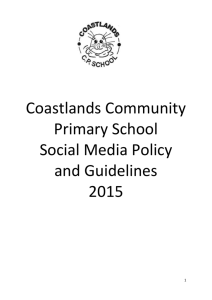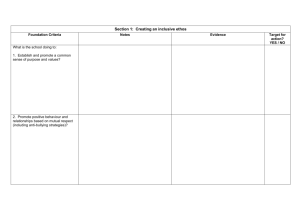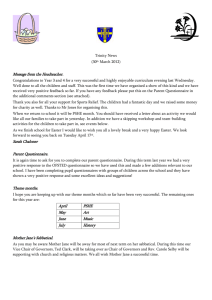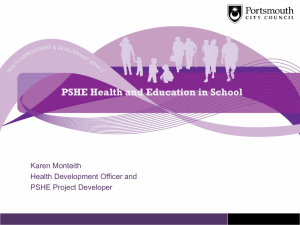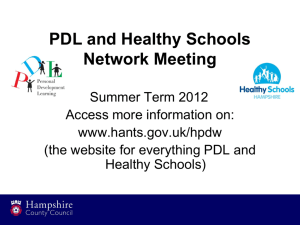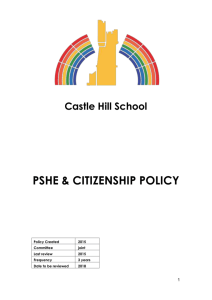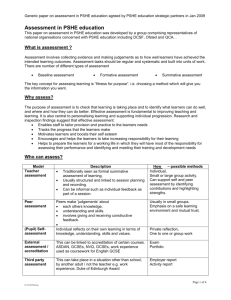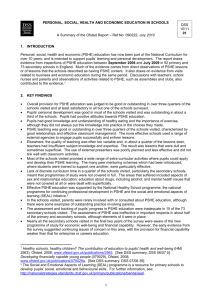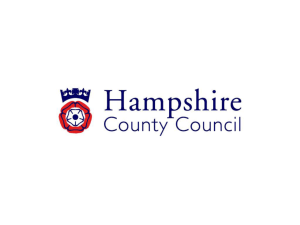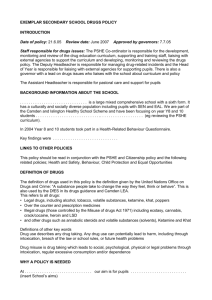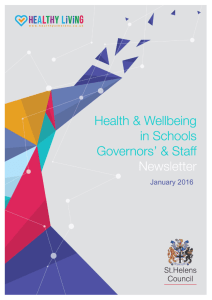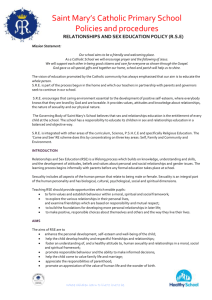Sex and Relationship Policy - St Michael and All Angels Website
advertisement
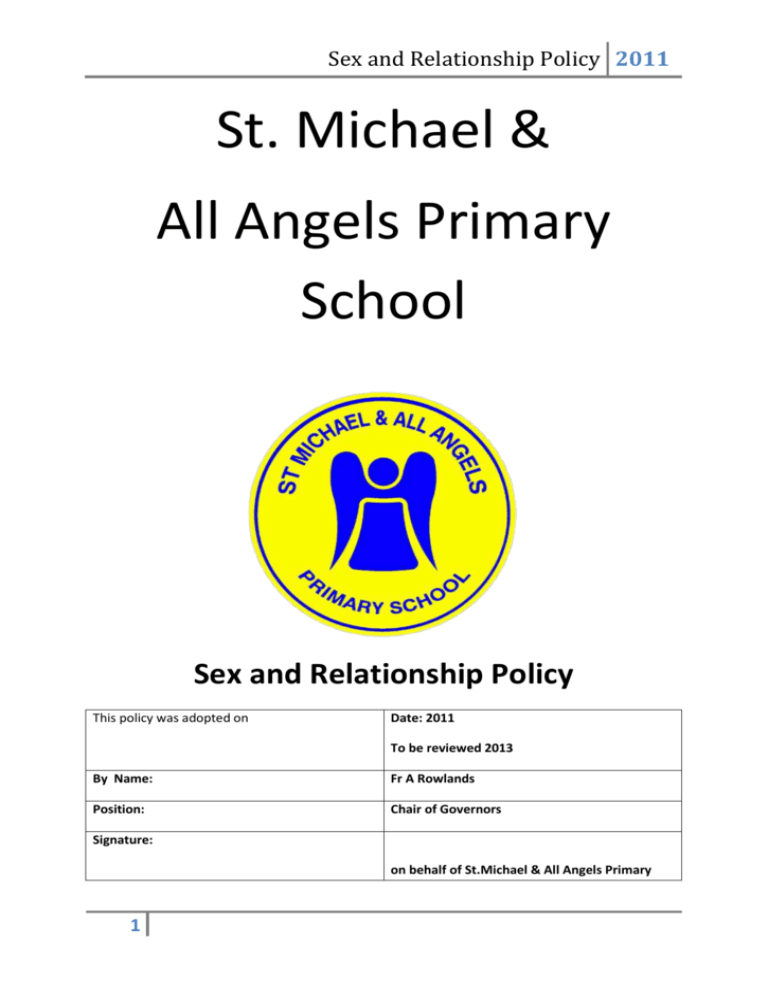
Sex and Relationship Policy 2011 St. Michael & All Angels Primary School Sex and Relationship Policy This policy was adopted on Date: 2011 To be reviewed 2013 By Name: Fr A Rowlands Position: Chair of Governors Signature: on behalf of St.Michael & All Angels Primary 1 Sex and Relationship Policy 2011 School Mission Statement At St Michael and All Angels School we are a Christian Community where everybody is valued and recognised for their unique contribution. Rationale The work of St Michael and All Angels School will be the result of reflection on the Gospels and the teaching of the Church. There are two important concepts which underpin any thinking on this subject. The dignity and worth of each person made in the image of God. The importance of individuals coming together in mutual support and regard, to live and work for the good of humankind and the glory of God. Our response to Government initiatives on Sex and Relationships Education (S.R.E.) must be: positive and prudent; guided by our vision of what it means to be human and our claims to educate the whole person; and the need to address issues raised by the actual experience of pupils today. ‘..children and young people should be helped to develop harmoniously their physical, moral and intellectual qualities… they should be given a positive and prudent education in matters relating to sex …children and young people have the right to be encouraged to make sound moral judgements with an informed conscience and to put them into practice by personal choice, and to know and love God better. 2 Declaration on Christian Education para. 1 Second Vatican Council ed. by. W. Abbott 1966 Aims and Objectives These include both religious and educational aspects and the promotion and development of attitudes and values which are truly gospel inspired, such as love, truth, justice, freedom, integrity and reconciliation. To provide, appropriate to age and ability an accurate knowledge and understanding about sexuality and relationships. To enable pupils to develop personal and social skills: to be confident in right relationships, to keep them safe from harm and to protect them from exploitation. 2 Sex and Relationship Policy 2011 Roles and Responsibilities: Parents: Will all have important parts to play in the sex education of our pupils, however, it is parents who are the first and best educators of their children. The school will seek to support parents in this role. Both the school and the Church recognise the central and primary role of parents in assisting their children’s physical, spiritual & psychological growth in preparation for the challenges and responsibilities of adult sexual life. Parents will be invited to key meetings prior to key phases and teaching blocks. Information is also sent home prior to teaching blocks. Governors: Have responsibility for ensuring there is a sex and relationship education policy, in consultation with parents and teachers, which is in keeping with Catholic teaching. If necessary they will provide guidelines for the teaching of sensitive issues. They will ensure that the policy is available to parents and that parents know of their right to withdraw their children. Governors will ensure that the programme and the resources are monitored and evaluated. This monitoring applies to both the taught curriculum. Teachers: (i) advise governors on the content and organisation of sex and relationship education; (ii) develop suitable procedures for dealing with requests from parents to withdraw their; children from sex education lessons; (iii) contribute to reviewing existing provision; (iv) use professional skills in developing the curriculum; (v) draw on help and guidance from relevant sources, e.g., health professionals, marriage and family life workers; (vi) teach sex and relationship education curriculum as detailed in the schemes of work; (vii) participate in monitoring and evaluating sex and relationship education. 3 Sex and Relationship Policy 2011 Provision of Programme: Responsibility for the policy and provision of sex and relationship education rests with the governing body. The headteacher carries delegated responsibility and is supported in the oversight of the programme. All staff have some responsibility for the sex and relationship education programme, supported by named member(s) of staff who have specific responsibility for this area of the curriculum. Legal requirements : Guidance from the DfES requires all secondary schools to provide Sex and Relationship Education and recommends that all primary schools should have a Sex and Relationship Education programme. In both cases the Sex and Relationship Education programme should be rooted in the PSHE framework. There are also legal requirements to which schools must respond. The new DfES 'Sex and Relationship Education Guidance states that: "All schools must have an up-to-date policy which is made available for inspection and to parents. The policy must; define Sex and Relationship Education; describe how Sex and Relationship Education is provided and who is responsible for providing it; how Sex and Relationship Education is monitored, evaluated and reviewed regularly." Management of the programme within the curriculum. How it is to be taught? (i)Year groups – mixed gender; (ii) Who is to teach it?- class teachers EYFS/KS 1 Lower KS 2 and Mrs Lester Upper KS 2; (iii)Where available outside speakers for KS 2 pupils with parental consent; (iv) annaully with PSHE weekly (v) It is to be placed in the curriculum and its relationship to religious education within HIA and the science national curriculum. Guidance to staff on how to organise groups, maintain boundaries, confidentiality, avoidance of personal questions directed at staff, dealing with questions and disclosures within Year group overview plans. 4 Sex and Relationship Policy 2011 Scheme of work The PSHE and Citizenship guidance is developed through four broad strands. The present requirements set out within the National Science Curriculum should be delivered through these broad strands and within the context of the National Healthy School Standards. The four themes are and responsibility and making the most of pupils’ abilities Education for personal relationship, which includes sex and relationship education should contribute to the foundation of PSHE and Citizenship by ensuring that all pupils: relationships. parts of the body; describe how their bodies work; can protect themselves; and ask for help and support. Science National Curriculum Key Stage 1 Animals, including humans, move feed, grow, use their senses and reproduce , compare and name the main external parts of the human body others with sensitivity. Key Stage 2 that the life processes common to humans and other animals include nutrition, growth and reproduction LINKS with HERE I AM and E.P.R. Introduction The following is intended as a guide for linking E.P.R./S.R.E with Here I Am. Some of these aspects might be covered in the Recognise section where the topic is being introduced, starting with the pupil’s own experience, and extending into the Respect and Reflect sections. Some ideas may be used in the Relate process where the teaching is explicitly concerned with Scripture and the teaching of Church. Another way of using this section when teaching some aspects of E.P.R./S.R.E. which occur in science, P.E., health education or drama etc., is to make use of the links with the religious education programme. 5 Sex and Relationship Policy 2011 List of resources, to be used which may include: Educational Guidance in Human Love CTS 1983. Education for Sexuality published by the C.E.S. in 1994 D.F.E Sex and Relationships Education Guidance DfEE 2000. Sex Education in Schools. Circular 5/94, Education Act 1993: SEAL programme Curriculum Guidance 5 Science National Curriculum As well as the classroom resources which are to be used in the teaching of S.R.E. 6

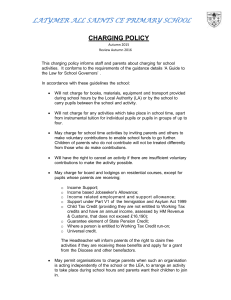
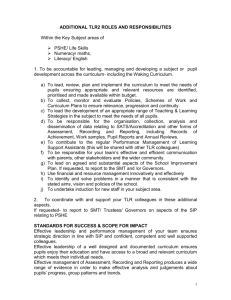
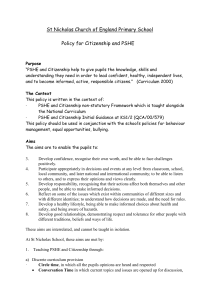

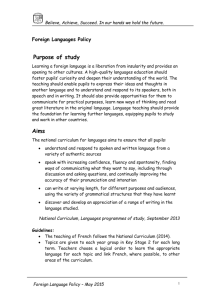

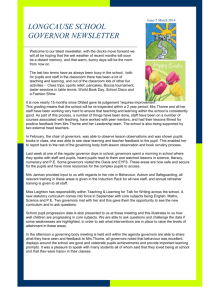
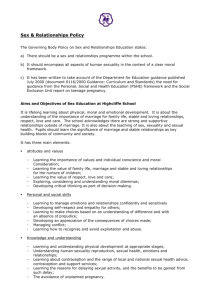
![afl_mat[1]](http://s2.studylib.net/store/data/005387843_1-8371eaaba182de7da429cb4369cd28fc-300x300.png)
